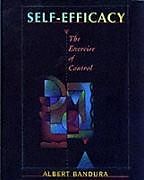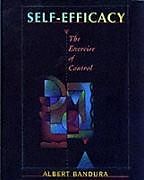Self Efficacy
Einband:
Kartonierter Einband
EAN:
9780716728504
Untertitel:
The Exercise of Control
Genre:
Psychologie
Autor:
Albert Bandura
Herausgeber:
Macmillan International Higher Education
Anzahl Seiten:
604
Erscheinungsdatum:
01.03.1997
ISBN:
978-0-7167-2850-4
Informationen zum Autor Albert Bandura Klappentext The renowned psychologist Albert Bandura's theory is that those with high self-efficacy expectancies (the belief that one can achieve what one sets out to do) are healthier, more effective and generally more successful than those with low self-efficacy expectancies. The author begins with a discussion of theory and method and then examines how belief in one's abilities affects development, mental functioning and health, with examples from the areas of psychopathology, athletics, business and international issues. The book is ideal for upper-level courses in social, developmental, clinical or organizational psychology as well as business, education, counselling and political science. Zusammenfassung The renowned psychologist Albert Bandura's theory is that those with high self-efficacy expectancies (the belief that one can achieve what one sets out to do) are healthier! more effective and generally more successful than those with low self-efficacy expectancies. Inhaltsverzeichnis 1. Theoretical Perspectives The Nature of Human Agency Human Agency in Triadic Reciprocal Causation Determinism and the Exercise of Self-Influence Related Views of Personal Efficacy 2. The Nature and Structure of Self-Efficacy Perceived Self-Efficacy as a Generative Capability Active Producers versus Passive Foretellers of Performances The Self-Efficacy Approach to Personal Causation Multidimensionality of Self-Efficacy Belief Systems Self-Efficacy Causality Sources of Discordance Between Efficacy Judgment and Action 3. Sources of Self-Efficacy Enactive Mastery Experience Vicarious Experience Verbal Persuasion Physiological and Affective States Integration of Efficacy Information 4. Mediating Processes Cognitive Processes Motivational Processes Affective Processes Selection Processes 5. Developmental Analysis of Self-Efficacy Origins of a Sense of Personal Agency Familial Sources of Self-Efficacy Peers and the Broadening and Validation of Self-Efficacy School as an Agency for Cultivating Self-Efficacy Growth of Self-Efficacy through Transitional Experiences of Adolescence Self-Efficacy Concerns of Adulthood Reappraisals of Self-Efficacy with Advancing Age 6. Cognitive Functioning Students' Cognitive Self-Efficacy Teachers' Perceived Efficacy Collective School Efficacy 7. Health Functioning Biological Effects of Perceived Self-Efficacy Perceived Self-Efficacy in Health Promoting Behavior Prognostic Judgments and Perceived Self-Efficacy 8. Clinical Functioning Anxiety and Phobic Dysfunctions Depression Eating Disorders Alcohol and Drug Abuse 9. Athletic Functioning Development of Athletic Skills Self-Regulation of Athletic Performance Collective Team Efficacy Psychobiological Effects of Physical Exercise 10. Organizational Functioning Career Development and Pursuits Mastery of Occupational Roles Self-Efficacy in Organizational Decision Making Self-Efficacy in Enactment of Occupational Roles Collective Organizational Efficacy 11. Collective Efficacy Gauging Collective Efficacy Political Efficacy Enablement by Media Modes of Influence Enablement for Sociocultural Change Underminers of Collective Efficacy References Name and Subject Indexes ...
Autorentext
Albert Bandura
Klappentext
The renowned psychologist Albert Bandura's theory is that those with high self-efficacy expectancies (the belief that one can achieve what one sets out to do) are healthier, more effective and generally more successful than those with low self-efficacy expectancies. The author begins with a discussion of theory and method and then examines how belief in one's abilities affects development, mental functioning and health, with examples from the areas of psychopathology, athletics, business and international issues. The book is ideal for upper-level courses in social, developmental, clinical or organizational psychology as well as business, education, counselling and political science.
Inhalt
1. Theoretical Perspectives
The Nature of Human Agency
Human Agency in Triadic Reciprocal Causation
Determinism and the Exercise of Self-Influence
Related Views of Personal Efficacy
2. The Nature and Structure of Self-Efficacy
Perceived Self-Efficacy as a Generative Capability
Active Producers versus Passive Foretellers of Performances
The Self-Efficacy Approach to
Personal Causation
Multidimensionality of Self-Efficacy Belief Systems
Self-Efficacy Causality
Sources of Discordance Between
Efficacy Judgment and Action
3. Sources of Self-Efficacy
Enactive Mastery Experience
Vicarious Experience
Verbal Persuasion
Physiological and Affective States
Integration of Efficacy Information
4. Mediating Processes
Cognitive Processes
Motivational Processes
Affective Processes
Selection Processes
5. Developmental Analysis of Self-Efficacy
Origins of a Sense of Personal Agency
Familial Sources of Self-Efficacy
Peers and the Broadening and
Validation of Self-Efficacy
School as an Agency for Cultivating Self-Efficacy
Growth of Self-Efficacy through
Transitional Experiences of Adolescence
Self-Efficacy Concerns of Adulthood
Reappraisals of Self-Efficacy with Advancing Age
6. Cognitive Functioning
Students' Cognitive Self-Efficacy
Teachers' Perceived Efficacy
Collective School Efficacy
7. Health Functioning
Biological Effects of Perceived Self-Efficacy
Perceived Self-Efficacy in Health
Promoting Behavior
Prognostic Judgments and Perceived Self-Efficacy
8. Clinical Functioning
Anxiety and Phobic Dysfunctions
Depression
Eating Disorders
Alcohol and Drug Abuse
9. Athletic Functioning
Development of Athletic Skills
Self-Regulation of Athletic Performance
Collective Team Efficacy
Psychobiological Effects of Physical Exercise
10. Organizational Functioning
Career Development and Pursuits
Mastery of Occupational Roles
Self-Efficacy in Organizational
Decision Making
Self-Efficacy in Enactment of Occupational Roles
Collective Organizational Efficacy
11. Collective Efficacy
Gauging Collective Efficacy
Political Efficacy
Enablement by Media Modes of Influence
Enablement for Sociocultural Change
Underminers of Collective Efficacy
References
Name and Subject Indexes

Leider konnten wir für diesen Artikel keine Preise ermitteln ...
billigbuch.ch sucht jetzt für Sie die besten Angebote ...
Die aktuellen Verkaufspreise von 6 Onlineshops werden in Realtime abgefragt.
Sie können das gewünschte Produkt anschliessend direkt beim Anbieter Ihrer Wahl bestellen.
Loading...
Die aktuellen Verkaufspreise von 6 Onlineshops werden in Realtime abgefragt.
Sie können das gewünschte Produkt anschliessend direkt beim Anbieter Ihrer Wahl bestellen.
| # | Onlineshop | Preis CHF | Versand CHF | Total CHF | ||
|---|---|---|---|---|---|---|
| 1 | Seller | 0.00 | 0.00 | 0.00 |
